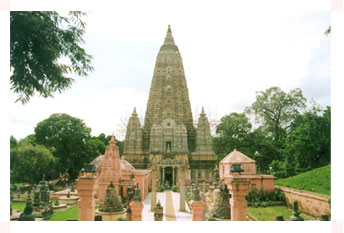Bihar
finds mention in the Vedas, Puranas, Epics etc and
was the main scene of activities of the Buddha and
the 24 Jain Tirthankaras. The hermitages of ancient
monastic orders cluster in the plains and hill sides.
The teachings of Buddha and Mahavira, deeply engraved
in the enduring ruins and relics ring down the corridors
of time. Religion is ever present in the daily life
of the people. Besides prominent ones like Hinduism,
Buddhism and Jainism, other religions like Islam,
Christianity, Sikhism etc are also found here.
found here.
The Hindus are the largest religious community in
Bihar. Hindu piety involves rituals and ceremonies,
celebrating festivals, making pilgrimages, building
temples, reading the Ramayana and chanting the Gayatri
Mantra. There are a huge number of temples in Bihar.
The Hinduism of the masses is chiefly characterized
by polytheism which has given rise to many cults
such as Shakta, Shaivism, Vaishnavism etc. Each
cult and sect has its own special gods or goddesses,
but all combine to revere other deities of the Hindu
pantheon and join in their worship.
The working religion of the peasant's everyday
life consists of the propitiation of his 'Ishta
Devata' (favourite deity), ghosts (bhuts) and spirits
(prets), in order that they may not afflict their
worshippers or may grant them material blessings.
The primitive propitiation of evil spirits and god
lings and the worship of the Hindu gods go on side
by side and quite often the same men make offerings
to both. Besides Brahma, Vishnu, Shiva and Durga,
one of the most important local deity is the elephant
headed god, Ganesha. Ritualistic greeting of the
rising sun and the ceremonial morning and the evening
ablutions are widely observed by all devout Brahmins.
Hindus believe in karma, image worship, rebirth
and fatalism. Worship in the temples is done by
Brahmin priests. He recites the mantras and makes
the offerings for the worshipper. The priests have
a considerable hold over the people especially in
the rural areas. Their advice is sought when a difficulty
arises, usually by the women. There are countless
grotesque and degrading superstitions in which so
many of the peasants and labourers still seek priesthood.
The priests hope by these means to retain their
hold on masses and even the more educated and liberal
minded among them do little actively to combat such
beliefs.
Hinduism in Bihar is a religion of caste rules
and usages. Its sanctions are ultimately social,
its laws immemorial group customs and its tribunal
the committee of the fraternity, it presents itself
to the ordinary man not as a statement of the eternal
principles of morality, but as a formidable code
of etiquette ruling the details of his personal
life. He finds himself greatly concerned that he
should not marry a woman not belonging to his caste
or dine with a man not of his own community, he
should not help the wrong man or entertain vague
caste prejudices against the right one. Bihar is
known for its factionalism, while others think of
themselves as Bengalis or Punjabis, Parsis or Muslims,
in Bihar their compatriots think of themselves only
as Bhumihars, Rajputs, Kayasthas or Maithil Brahmins.
Hinduism offers them the hope of salvation from
the hard life they lead.
|